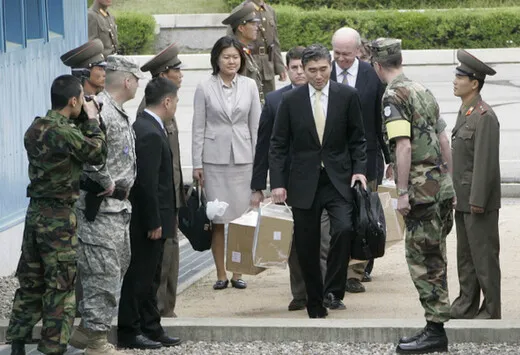hankyoreh
Links to other country sites 다른 나라 사이트 링크
[Analysis] S. Korea losing its place in Northeast Asian relations

The diplomatic situation in Northeast Asia is changing quickly. Relations between North Korea and the United States have improved remarkably with recent progress in the North Korean nuclear issue. Ties between China and Japan are also facing a kind of honeymoon period following the Chinese president’s first visit to Japan in 10 years. But inter-Korean relations have been tense since the launch of the administration of President Lee Myung-bak. Many analysts point out that Korea’s standing in the politics of the Korean Peninsula reminds them of Japan, which has been left out of the six-party talks due to conflict over the handling of Japanese citizens allegedly kidnapped by North Korea.
Wang Jiarui, the head of the Chinese Communist Party’s international department, met with Rep. Chung Mong-joon of the ruling Grand National Party on April 21 in Beijing. Chung quoted Wang as saying, “As relations between North Korea and the U.S. have been changing and China-Japan relations have seen rapid improvement, Korea is the only one that seems not to know what the real situation is in this area.”
Wang also spoke with Chung about a remark by Unification Minister Kim Ha-joong, in which he said that it would be difficult to expand Gaeseong (Kaesong) Industrial Complex unless the North Korean nuclear issue is resolved. Chung quoted Wang as saying, “As foreign diplomacy is like an art, the means of expression should not be rude.” Wang’s outspoken comments seem to be something of a complaint about Korea’s hard-line policies on the North, and could be interpreted as concern about the relationship between Seoul and Beijing.
Improvement in relations between North Korea and the United States has resulted in a number of changes as well. Last week, Pyongyang gave Washington 18,000 pages of information on its Yongbyon reactor. The United States is expected to provide food assistance to the North. It is also likely that the United States will remove the North from its list of states sponsoring terrorism.
Meanwhile, Chinese President Hu Jintao has agreed to pursue a comprehensive, strategic, mutual relationship at the summit talks between China and Japan.
The warm breeze has not, however, blown in the direction of inter-Korean relations. The South’s diplomatic capacity in terms of Northeast Asian relations and the North Korean nuclear issue has so far been dependant upon the inter-Korean relationship, but Seoul’s influence on these issues has decreased considerably. Since the inauguration of President Lee, inter-Korean relations have been tense and, consequentially, the South’s diplomatic resources have diminished. The South is now concerned that the North could exclude South Korea from its dialogue with the United States.
Food aid from the South to the North could serve as a breakthrough in relations between the two Koreas. However, the South is of the position that it will only consider the providing humanitarian aid if there is request from the North. A former key foreign relations and security official said, speaking on condition of anonymity, “The administration of President Lee should, first of all, abandon the partisan idea that it is capable of ‘restoring the lost decade,’” referring to the previous two administration’s sunshine policy of engagement with North Korea, “and try to grasp the reality of the rapidly changing political situation in Northeast Asia over the past 10 years.”
Please direct questions or comments to [englishhani@hani.co.kr]
Editorial・opinion
![[Editorial] Korea cannot afford to rush to a deal with the US [Editorial] Korea cannot afford to rush to a deal with the US](https://flexible.img.hani.co.kr/flexible/normal/500/300/imgdb/original/2025/1020/5617609491967904.jpg) [Editorial] Korea cannot afford to rush to a deal with the US
[Editorial] Korea cannot afford to rush to a deal with the US![[Column] Shared dilemmas at a historic turning point for Korea, Europe [Column] Shared dilemmas at a historic turning point for Korea, Europe](https://flexible.img.hani.co.kr/flexible/normal/500/300/imgdb/original/2025/1020/8417609480329443.jpg) [Column] Shared dilemmas at a historic turning point for Korea, Europe
[Column] Shared dilemmas at a historic turning point for Korea, Europe- [Column] Halfway across the world, I’m cheering on Americans fighting for democracy
- [Column] How meritocracy turns into tyranny
- [Column] The real scandal of Korea’s ‘divorce of the century’
- [Column] The meritocracy to fascism pipeline
- [Column] Korea is not an enemy to be plundered
- [Column] Chaebol can’t take credit for KOSPI’s record rally
- [Column] Solving the dilemma of OPCON transfer and inter-Korean relations
- [Column] Korea, don’t trust and don’t be fooled
Most viewed articles
- 1North Korea fires ballistic missile toward East Sea
- 2[Interview] Politics of care as an antidote to divisions caused by meritocracy
- 3[Korea travels] Tteokbokki: The Korean soul food 500 years in the making
- 4Korea can help rebuild US shipbuilding industry, bolster maritime strength, says US think tank
- 5Korea’s Democrats unveil plan to expand Supreme Court from 14 to 26 justices
- 6[Column] Shared dilemmas at a historic turning point for Korea, Europe
- 7Trump’s interest in Kim Jong-un stems from real estate development hopes, says ex-US official
- 8Real-life heroes of “A Taxi Driver” pass away without having reunited
- 9Buddhism’s cool new image turns Korea’s Gen Z into Generation Zen
- 10Korean police seek to detain nationals allegedly involved in Cambodia-based scams